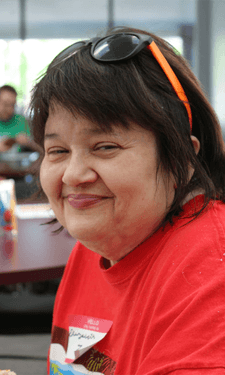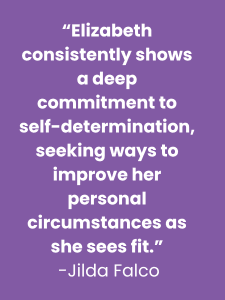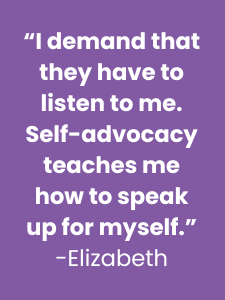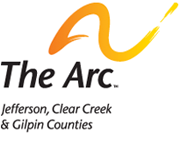
Empowered to Choose Life-Saving Care: Elizabeth’s Story

Elizabeth’s health had taken a turn.
The Colorado woman, who was born with disabilities, had been working toward her goal of living independently. But leading up to the spring of 2024, Elizabeth faced medical complications that forced her to move out of an assisted living facility and into a nursing home.
Further, serious complications with Elizabeth’s blood pressure and breathing changed everything once again. One day, Elizabeth stopped breathing completely. After receiving CPR, she found herself lying in a hospital room, feeling alone, only able to breathe through the use of a ventilator.
Elizabeth looked up at the medical team treating her. She told them, “I don’t want to live anymore.”
Plans were soon made to take Elizabeth off of ventilator support, which would end her life. However, Elizabeth realized she wasn’t sure what she truly wanted—and she felt unclear about what other options, if any, were available to her.
As she stayed in the hospital, Elizabeth struggled to communicate with everyone around her. Her ventilator made it difficult to speak. Her hands were too weak to write. She attempted to tell nursing staff what she needed each day, but they often responded that they couldn’t understand her. Elizabeth’s frustration was immeasurable. One interaction left her in tears.
I can’t do anything, she thought. You don’t understand how it feels.
On May 23, the day that doctors were scheduled to remove Elizabeth’s ventilator support, Elizabeth woke up prepared to say goodbye to her sister for the last time that day. But she felt uneasy.
“I was feeling depressed, scared, and confused,” Elizabeth said, “like I don't know what I want.”
Exploring All Options
That day, Jilda Falco, The Arc-JCC&GC’s Senior Director of Advocacy Programs, visited Elizabeth with Elizabeth’s sister, Anna. As an advocate, Jilda had been supporting Elizabeth for several years, first with exploring a path to independent living and then with navigating different chapters in Elizabeth’s life.
At the hospital, Jilda spoke to Elizabeth’s nurse. She wanted to ensure Elizabeth knew all her options, so she first asked the nurse what those options were. The nurse explained that Elizabeth could have her ventilator support removed. But Elizabeth also had another choice: If she was not ready to say goodbye, she could undergo several procedures and live. Following this, Elizabeth would likely need to live in a high-level skilled nursing facility. She would need to use a ventilator going forward, and she would also potentially need a feeding tube, the nurse said.
Jilda walked Elizabeth through these possibilities. “We talked about, ‘You can say goodbye if you want, and we'll be here for you through that,’” Jilda explained. “‘You also get to choose these other options if you want, and here's what life will look like if you make that choice.’”

Elizabeth felt surprised as Jilda described this second option. When Jilda asked Elizabeth what she wanted, Elizabeth told her she wasn’t sure. So she continued the discussion with Anna and Jilda, weighing her choices. The conversation was crucial for Elizabeth, who said talking things through is the way she likes to make decisions.
“I can't make my own choice without speaking to somebody and getting (information) through my head,” Elizabeth explained.
At the end of this conversation, Elizabeth felt ready to make her decision. Because she is still young—only 55 years old—and because of her friendships, she chose to get the procedures that would help her stay alive.
Jilda and Anna helped Elizabeth communicate her wishes to her medical team. Later on, to address the communication difficulties Elizabeth was facing, Jilda also helped Elizabeth create basic communication boards, which she could use to convey her daily needs to staff.
Shaping Her Own Future
Elizabeth underwent the necessary procedures, and she was prepared for big adjustments to her daily life.
But despite being told she would need a ventilator and feeding tube, within weeks, Elizabeth could breathe on her own, without a ventilator, and eat on her own, without a feeding tube. She also quickly got back to some of her interests, like scrolling through Facebook on her phone.
“She consistently shows a deep commitment to self-determination, seeking ways to improve her personal circumstances as she sees fit,” Jilda said. “I’ve always appreciated Elizabeth’s fierce determination to take charge of her life and actively participate in all aspects.”

For advocates at The Arc like Jilda, the goal of their work is to help people with intellectual and developmental disabilities (IDD) navigate challenges and make informed decisions, Jilda said—and in this situation, Jilda supported Elizabeth in doing just that.
“I’ve been deeply honored to participate in honest, vulnerable conversations with (Elizabeth) regarding her medical decisions and wishes,” Jilda reflected. “By providing clear, accessible information, Elizabeth was empowered to make informed choices that shaped her future. Elizabeth was able to clearly express her will and desire to continue living on her own terms.”
Today, Elizabeth is working to regain her strength. She hopes to continue pursuing her dream from before. “My goal is to live on my own,” she said. “My other goal is to go back to my meetings face-to-face instead of trying to get on Zoom all the time.” Elizabeth regularly attends People First meetings, which are self-advocacy meetings that take place at The Arc’s office.
Looking ahead, she plans to continue making her voice heard by self-advocating whenever she needs to.
“Before The Arc, I would say, ‘I give up. No one’s listening to me. Everyone’s shutting me down,’” Elizabeth said. “Sometimes, people do shut me down still, but I demand that they have to listen to me. Self-advocacy teaches me how to speak up for myself.”
What would have happened if The Arc hadn’t been involved? If you agree that it’s important that everyone understands their options and can make the choices that lead to the future they want, please consider making a donation today.
 English
English Spanish
Spanish Chinese (Simplified)
Chinese (Simplified) Japanese
Japanese Korean
Korean Russian
Russian
